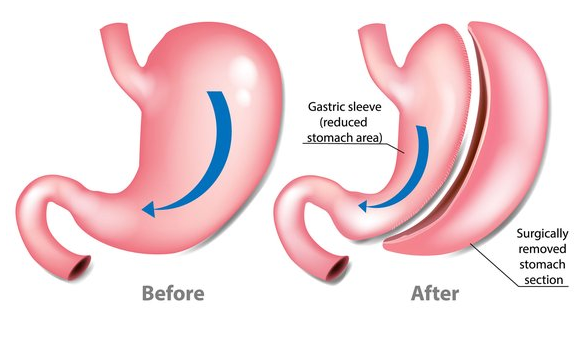Are you considering undergoing a gastric sleeve surgery because you have tried exercise and diets for a long time, but still have a lot of excess weight to lose? Still not sure what the benefits of a gastric sleeve surgery and how it can help you?
The main benefit of gastric sleeve surgery is to help people who are obese to lose their excess weight. On average, the procedure help patient to lose about 60% to 70% of their extra weight. Numerous studies have also suggested that the procedure is very effective at treating diabetes, high blood pressure (hypertension), and other medical conditions linked with morbid obesity. The procedure can also boost patients’ confidence and vitality, especially since they can engage in more activities.
Before we discuss the benefits of gastric sleeve surgery, let’s take a look at the basics of the procedure.
Understanding gastric sleeve surgery
Gastric sleeve is a type of weight loss surgery that is best for people who have a body mass index (BM) of at least 40.
With gastric sleeve surgery, surgeons reduce your stomach to a sleeve/banana-like shape by removing parts of it. Your stomach is reduced to roughly the size of a banana or about 1 per 10th the size of your original stomach. With just a small portion of your stomach left, you will feel full a lot quicker than you did before and you will not be able to eat as much as you used to, which will help you lose weight. In addition, this procedure also reduces your body’s ability to produce a hunger hormone known as ghrelin, so you will feel hungry less often after your surgery.
The surgery is irreversible and it has been proven to help people lose a large proportion of their excess weight. According to the National Institute of Diabetes and Digestive and Kidney Diseases, people lose an average of 90 pounds following their gastric sleeve surgery.
Gastric sleeve is most often performed as a laparoscopic procedure, which involves making around five or six small incisions in the abdomen to insert an instrument called a laparoscope, which is an instrument with a tiny camera attached to its end that sends pictures to a monitor. Then, additional cuts are made to remove part of your stomach.
Gastric surgery takes about an hour to complete, and patients usually need to stay in the hospital for a day or two. The recovery for this procedure is fairly quick, you should be able to return to your normal activities within two to four weeks. Although you want to refrain from doing any strenuous activities for about six weeks. To achieve the best possible result of the procedure, you may need to have routine testing of the vitamin levels in your body to ensure that your body is getting the vitamins and nutrients it needs.
Keep in mind that, following your gastric sleeve surgery, you have to change the way you eat forever. Here’s a little pointer:
- Before swallowing your food, make sure to chew everything thoroughly.
- Do not drink while you eat as it can cause your stomach to overfill.
- Avoid snacking and high-calorie sodas.
- A half-hour after finishing a meal, drink liquids.
- Take vitamin and mineral supplements every day.

Gastric Sleeve Before and After
The benefits of a gastric sleeve surgery
While the weight loss result of a gastric sleeve surgery can vary depending on the individual and there is no guarantee of specific results, the procedure does offer a lot of benefits. Here are some of the main benefits of a gastric sleeve surgery that might convince you to have it:
Increase your quality of life
One potential consequence of obesity is a decline in quality of life as it can cause physical limitations, fatigue, and bodily pain. According to research by the National Health and Nutrition Examination, morbidly obese women (those with BMI over 40) were four times more likely to be depressed as women with a normal BMI.
A Gastric Sleeve can improve patients’ quality of life significantly. Many studies have shown that patients who had a gastric sleeve surgery report improvements in psychosocial function as they lose more weight. They can enjoy many activities that they could not do before the surgery. Therefore, not only successful gastric sleeve surgery allows patients to live longer but it also allows them to live much better.
Long term remission for type 2 diabetes
One of the major risk factors for developing type 2 diabetes is obesity. In fact, more than 90% of people who have type 2 diabetes are overweight or obese. Diabetes can be fatal as it is the leading cause of kidney failure, new cases of blindness among adults, and non-traumatic lower-limb amputations. This disease is also closely linked to an increased risk of high blood pressure, heart disease, stroke, blindness, nervous system disease, amputations, kidney disease, and pregnancy complications.
Several days to weeks following the surgery, patients can experience significant improvement in metabolic control. This reflects an alteration in metabolism that is independent of weight loss.

Eliminate hypertension and hyperlipidemia
Current research suggests that overweight and obesity accounted for around 28% of cases of high blood pressure in women and 26% in men. Overweight and obesity also accounted for approximately 15% of coronary heart disease cases in women and 23% in men.
Gastric sleeve is reported to cause hypertension normalization in about 30% to 50% of patients. The need for antihypertensive treatment is also reduced by 20% to 30% of patients.
Relieve joint pain and osteoarthritis
Carrying around excessive weight can put a lot of stress on your joints, and it often causes chronic pain and joint damage. Women with a BMI > 30 are at risk of needing joint replacement compared with women with normal BMI. Furthermore, most people with osteoarthritis develop joint pain involving a weight-bearing joint.
Since gastric sleeve offers significant and sustained weight loss, the procedure can relieve the stress on joints, allowing patients to enjoy much more mobility and stop using pain medications. Studies have also found that gastric sleeve surgery provides a dramatic reduction in pain among patients with knee osteoarthritic pain. The same study also found that the frequency of back pain was reduced in up to 83 percent of patients.
Alleviate fatty liver disease
Morbid obesity is strongly associated with the development of nonalcoholic fatty liver disease (NAFLD) and nonalcoholic steatohepatitis (NASH). Because there is no excellent treatment for NASH and NAFLD except weight loss and lifestyle modification, gastric sleeve (along with other types of bariatric surgery) have been found to be the most effective treatment to slow down or reverse the progression of the diseases.
Eliminate obstructive sleep apnea
The strongest risk factor for obstructive sleep apnea is obesity. Continuous positive airway pressure (CPAP) therapy and weight loss are the foundation of treatment for sleep apnea. Therefore, achieving and sustaining a normal weight through gastric sleeve allows patients with obstructive sleep apnea to stop using the CPAP machine before they go to sleep.
Reduce the risk of obesity-associated cancer
The risk of developing various cancers, including cancers of the gallbladder, colon, breast, endometrium, and pancreas is increased significantly when you are obese. Obese men have about a 52% higher chance of dying from cancer, while obese women have a 62% higher chance of dying from cancer compared with those with normal weight. Gastric sleeve surgery has been shown to reduce the risk of developing new cancers and even decrease cancer-related mortality by 60%.
Improve fertility and polycystic ovary syndrome
Gastric sleeve surgery can improve fertility and treat polycystic ovarian syndrome (PCOS). Around 30% to 70% of obese women of reproductive age are found to have an irregular period, a high risk of infertility, and excessive hair.
Mortality
Numerous studies have revealed that obesity is associated with a higher chance of dying early. Given the dramatic weight loss that gastric sleeve surgery provides, it can result in up to 89% reduction of mortality.
Relief of depression
Poor body image and social stigma cause many obese people to feel depressed. People with significant extra weight may also find it hard to participate in activities that they might otherwise enjoy, resulting in depression and social isolation. The significant weight loss that gastric sleeve offer can improve patients’ emotional and mental health.
Much more effective than some other types of weight loss surgery
Gastric sleeve surgery has been found to be a lot more effective than the gastric band procedure, which is another type of weight loss surgery where a surgeon places a silicone band around the upper area of the stomach to decrease its size. The procedure is almost as effective as a gastric bypass but does not possess the risks that gastric bypass has.
